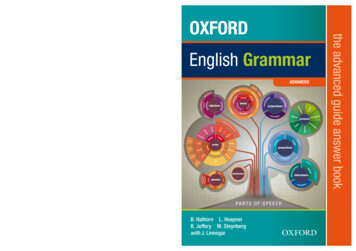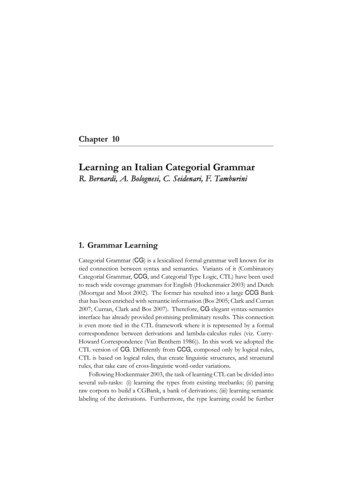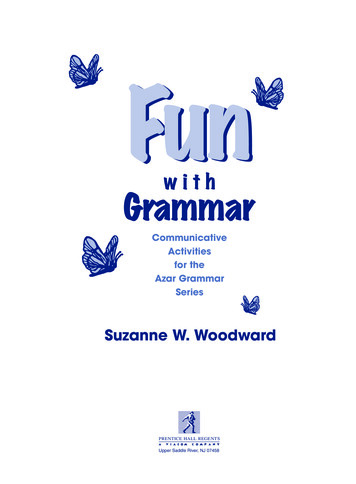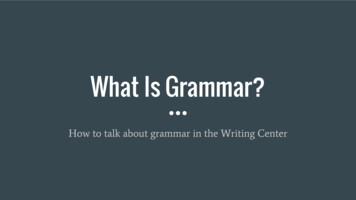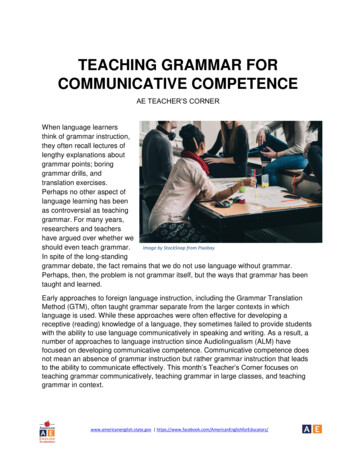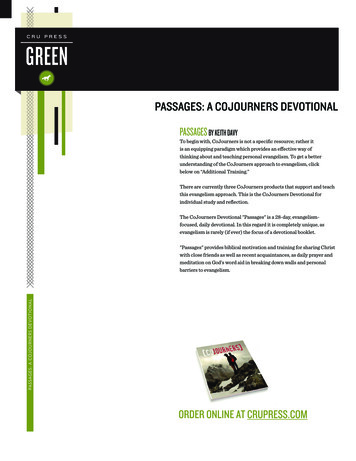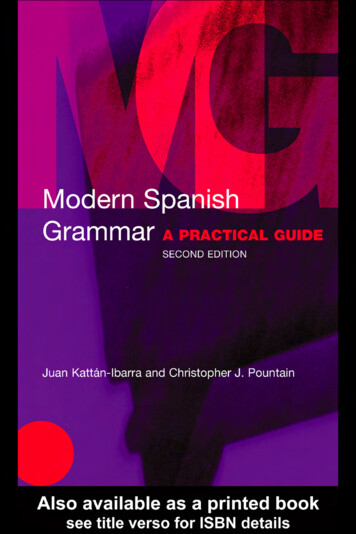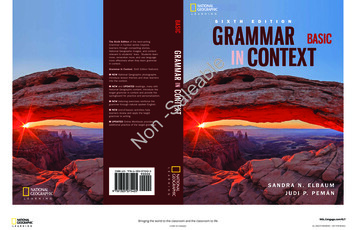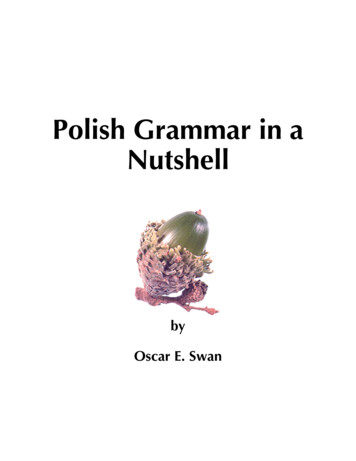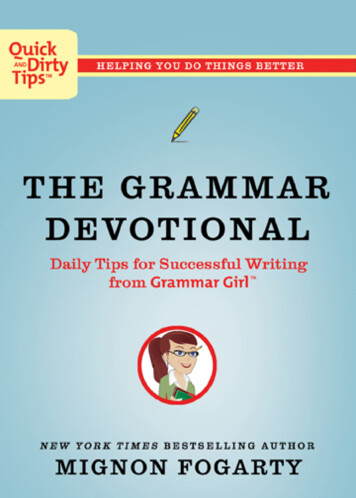
Transcription
020-41765 ch00 7P.qxp9/4/094:38 PMPage iTheGrammarDevotional
020-41765 ch00 7P.qxp9/4/094:38 PMPage iiAlso by Mignon FogartyGrammar Girl’s Quick and Dirty Tipsfor Better Writing
020-41765 ch00 7P.qxp9/4/094:38 PMPage iiiTheGrammarDevotionalDAILY TIPS forSUCCESSFULWRITING fromGRAMMAR GIRL M I G N O N F O G A RT YA HOLT PAPERBACK HENRY HOLT AND COMPANY New York
020-41765 ch00 7P.qxp9/4/094:38 PMPage iv“A rule is just a style with an army.”—ANDREW SCHWALM(A play on the more well-known quotation from an unknown student of the Yiddish linguist Max Weinreich: “A language is just a dialect with an army and navy.”)Holt PaperbacksHenry Holt and Company, LLCPublishers since 1866175 Fifth AvenueNew York, New York 10010www.henryholt.comA Holt Paperback and are registered trademarks of Henry Holt andCompany, LLC.Copyright 2009 by Mignon Fogarty, Inc.All rights reserved.Distributed in Canada by H. B. Fenn and Company Ltd.Library of Congress Cataloging-in-Publication DataFogarty, Mignon.The grammar devotional : daily tips for successful writing from grammar girl /Mignon Fogarty. — 1st Holt paperbacks ed.p. cm.“A Holt Paperback.”Includes bibliographical references and index.ISBN 978-0-8050-9165-61. English language—Grammar. 2. English language—Rhetoric. 3. Reportwriting. I. Title.PE1112.F6125 2009428.2—dc222009023847Henry Holt books are available for special promotions and premiums.For details contact: Director, Special Markets.First Holt Paperbacks Edition 2009Designed by Meryl Sussman LevaviIllustrations by Arnie TenPrinted in the United States of America10 9 8 7 6 5 4 3 2 1
020-41765 ch00 7P.qxp9/4/094:38 PMPage vTheGrammarDevotional
020-41765 ch01 7P.qxp9/4/094:41 PMPage 1IntroductionPeople are often moved and challenged by nuggets gleanedon a daily basis—whether from a spiritual devotional, a tip-a-daycalendar, or a regularly e-mailed newsletter. But there are fewgroups who need constant encouragement more than writers—itis, after all, a mostly solitary practice. The Grammar Devotional,then, is here to help you: it has daily reminders of our basic tenets(who versus whom, anyone?); inspiring profiles of writers andgrammarians who have helped English evolve to what it is today;and quizzes, word scrambles, and word searches to help solidifynewly learned tips.English is a messy language. Unlike French, we don’t have acouncil to decide how we should write or speak. We only have amultitude of competing college handbooks, dictionaries, and usage and style guides, such as The Chicago Manual of Style andThe Associated Press Stylebook, which frequently disagree. Spaceis tight in this book, and I like to keep things simple, but whereverpossible I point out when something is a style rather than a rule.Too many people go around believing the way they learned to dothings is the only way to do things, when really it’s just one of theacceptable choices.1
020-41765 ch01 7P.qxp9/4/094:41 PMPage 2As you will see, the book is organized by generic weeks soyou can start any time. It’s meant to be read through, just like adevotional, but we’ve also included an index so you can use thebook as a reference guide and quickly find specific tips when youneed them. Most of the time, punctuation is on Monday, Language Rock Stars are on Wednesday, quizzes and word scramblesare on Friday, and word search puzzles and cartoons are on Sunday, although I occasionally deviate from this pattern to keep related entries together.It may seem like a trivial endeavor, a tip each day, but at theend of a year the knowledge adds up. A year’s worth of newknowledge can imbue your writing with new confidence. Here’sto better e-mail messages, essays, marketing materials, articles,and novels.2
020-41765 ch01 7P.qxpWEEK 19/4/094:41 PMPage 3MONDAYTHE BURGER OF MCDONALD’S:MAKING POSSESSIVE NAMES POSSESSIVEHave you ever wondered how to make a possessive namesuch as McDonald’s, Carl’s, or St. Anthony’s possessive?The short answer is don’t! Rewrite the sentence to avoid sucha construction because, technically, you’re supposed to addanother apostrophe or apostrophe and s on the end—whichlooks ridiculous.McDonald’s’s earnings were super-sized last quarter.(technically correct)McDonald’s’ earnings were super-sized last quarter.(technically correct)McDonald’s reported super-sized earnings last quarter.(better)See page 75 to learn why there are two competing technicallycorrect answers.WEEK 1T UE SDAYI LOVE YOU: SUBJECT VERSUS OBJECTTo figure out things such as when to use who or whom or layor lie, you need to be able to identify the subject and objectof a sentence.Fortunately, it’s easy! The subject is the person or thing doingsomething, and the object is having something done to it.Just remember the sentence I love you. I is the subject. You isthe object of the sentence and also the object of my affection.How’s that? You are the object of my affection and the objectof my sentence. It’s like a Valentine’s Day card and grammartrick all rolled into one.3
020-41765 ch01 7P.qxpWEEK 19/4/094:41 PMPage 4W E DNE SDAYLANGUAGE ROCK STAR: JED HARTMANLAW OF PRESCRIPTIVIST RETALIATIONAND THEHartman’s Law of Prescriptivist Retaliation, coined by technical writer Jed Hartman in his Web-based column, Words &Stuff (http://www.kith.org/logos/words/words.html), statesthat “any article or statement about correct grammar, punctuation, or spelling is bound to contain at least one eror.” It issometimes also known as McKean’s Law after lexicographerErin McKean or Skitt’s Law for alt.usage.english (http://www.alt-usage-english.org) contributor Skitt, both of whom appear to have independently made the same observation. Anyerrors you find in this text were put there intentionally as atest to see if you are paying attention. Honest.WEEK 1T HUR SDAYSO MANY TALENTS: NOT ONLY . . . BUT ALSOWhen not only is followed by but also (or simply but), it’sconsidered good form to make sure the parts that follow eachset of words are formatted the same way.He is not only a great swimmer, but also a greatmusician. (Good: the sentence uses two noun clauses,which are underlined.)He is not only a great swimmer, but also playsamazing music. (Bad: the sentence uses a noun clauseand a verb clause. It’s bad because they don’t match.)You could make the second example better by rewriting itwith two verb clauses:He not only swims with ease, but also plays amazingmusic.4
020-41765 ch01 7P.qxpWEEK 19/4/094:41 PMPage 5FR IDAYQUIZ: YOU’RE WELCOMEWhich of the following is incorrect?a.b.c.d.e.f.Squiggly received a warm welcome.Please welcome Squiggly.Squiggly’s arrival was a welcome distraction.You’re welcomed.They welcomed Squiggly to the family.Welcome!The answer and an explanation are on page 211.WEEK 1SAT UR DAYA SUPPOSED RULE:SUPPOSEDLY VERSUS SUPPOSABLYIt would be much easier if I could tell you that supposably isn’ta word, but I can’t. It is a word, but the problem is that supposably doesn’t mean the same thing as supposedly and mostpeople use it incorrectly.The word you usually want is supposedly, which meansroughly “assumed to be true” and almost always includes ahint of sarcasm or disbelief:Supposedly, he canceled our date because of a familyemergency.She supposedly sent the check, but it was lost in themail.Supposably means “supposable,” “conceivable,” or “arguably.”It is only a valid word in American English; the British wiselyrefuse to accept it.5
020-41765 ch01 7P.qxpWEEK 19/4/094:41 PMPage 6SUNDAYTHAT PROBLEMAlways make sure your thats are necessary. For example,these two sentences mean the same thing, so you can leaveout the that.The sandwich that I ate yesterday was delicious.The sandwichI ate yesterday was delicious.If your sentence has multiple thats, see if you can take someout without changing the meaning.I know that she would prefer that people call herCookie.I knowCookie.she would prefer that people call herUnfortunately, many people delete thats even when they’reneeded for clarity. Here’s an example of a sentence that couldinitially confuse readers when you omit the word that:Aardvark maintains Squiggly’s yard is too large.(wrong)Because there’s no that after maintains, readers could initiallybelieve that Aardvark takes care of (maintains) Squiggly’slawn until they reach the phrase is too large. A that makes itclear Aardvark has an opinion, not a job.Aardvark maintains that Squiggly’s yard is too large.Aardvark maintains Squiggly’s yard.6Aardvark maintains that Squiggly’syard is too large.
020-41765 ch01 7P.qxpWEEK 2AND9/4/094:41 PMPage 7MONDAYPER SEAND: AMPERSANDSThe ampersand (&) is a symbol for and. Unlike the percentor degree symbol, you generally shouldn’t use the ampersandexcept in the most informal situations. Some style guides allow them as part of a formal company name (Smith & Wesson,Tiffany & Co.). Other style guides recommend spelling outthe and in such cases. Most style guides recommend usingthe ampersand when the rest of the name is also an abbreviation (AT&T) and in common expressions (R&D). As yousee here, there are no spaces on either side of the ampersandwhen it is used in that way.In common phrases, and can also be abbreviated using apostrophes for the missing letters: rock ’n’ roll.WEEK 2T UE SDAYSHIBBOLETHPeople can be as passionate about language as they are aboutreligion, and sometimes the two intersect. For example, linguists sometimes describe a word as a shibboleth. It meansthat the word tags you as a member of a certain group orclass. For example, if you say irregardless, it tags you as someone who is poorly educated or doesn’t use proper language.Shibboleth is a Hebrew word, and its linguistic meaning stemsfrom the Biblical story of the Gileadites, who used the word toidentify Ephraimites. The Ephraimites could not pronouncethe “sh” sound, so shibboleth came out sounding wrong, making them instantly identifiable.7
020-41765 ch01 7P.qxpWEEK 29/4/094:41 PMPage 8W E DNE SDAYLANGUAGE ROCK STAR: SAMUEL JOHNSONSamuel Johnson was the lone author of A Dictionary of theEnglish Language, which was arguably the most influentialEnglish dictionary from its publication in 1755 until thepublication of the Oxford English Dictionary in 1928. It tookJohnson nine years to write the nearly forty-three thousandentries. Although Johnson’s dictionary was the first attemptat a comprehensive English dictionary and embraced the inclusion of multiple definitions and the use of illustrative quotations in a way no previous dictionary had, it also had biasesand humor. For example, the definition for “lexicographer”included “a writer of dictionaries; a harmless drudge.”WEEK 2T HUR SDAYWHO? WHAT? WHICH?INTERROGATIVE PRONOUNSIt may seem odd that question words are pronouns. Don’tpronouns stand in for nouns? Well, not all of them. The interrogative pronouns (who, whom, what, which, whose, whoever, whomever, whatever, whichever) are used to ask questions.Usually you can rewrite the answer to the question as thequestion itself with a noun or adjective in place of the pronoun.Who wants chocolate? Squiggly wants chocolate.Whom should we invite? We should invite Aardvark.What is that class called? That class is called FondueBasics.Which car did they take? They took the green car.8
020-41765 ch01 7P.qxpWEEK 29/4/094:41 PMPage 9FR IDAYWORD SCRAMBLE: TYPESOFPRONOUNSThere are six major types of pronouns. See if you can unscramble their etveltgteivoirrnaeThe answer key is on page 211.WEEK 2SAT UR DAYHOW MANY BLONDES DOES IT TAKE?BLOND VERSUS BLONDEIt sounds like a joke, but it’s actually a legitimate question:How do you spell blond?The word comes to English from French, in which it has masculine and feminine forms. As an English noun, it kept thosetwo forms; thus, a blond is a fair-haired man and a blonde isa fair-haired woman. When you’re using the word as anadjective, there is only one spelling: blond.The blonde was delighted when Squigglypresented her with a dictionary.She wondered whether Squiggly could beconsidered a blond. He was yellow, after all.She had yellow-blond hair, but Squiggly only hadyellow skin.9
020-41765 ch01 7P.qxpWEEK 29/4/094:41 PMPage 10SUNDAYMYRIADI like myriad 10,000 Maniacs songs—“These Are Days,”“Candy Everybody Wants,” “Few and Far Between,” and probably more that I can’t think of right now. But do a few makea myriad?The word myriad is derived from the Greek word for tenthousand and has long since come to mean “a whole bunch”or “an uncountable multitude,” so it’s hard to argue that myriad is a good way to describe three or four songs. Various,a few, or many would probably be better choices.Another hot debate is whether it is correct to say, “The forestcontains myriad species” or “The forest contains a myriad ofspecies.” You commonly hear “a myriad of” and just as commonly hear people railing that it should be simply “myriad”because the word is an adjective and essentially equivalentto a number. You wouldn’t say “There are a ten thousand ofspecies,” so you shouldn’t say “There are a myriad of species,”so the argument goes.Believe it or not, most language experts say that either way isfine. Myriad was actually used as a noun in English longbefore it was used as an adjective, and today it’s consideredboth a noun and an adjective, which means it can be usedwith an a before it (as a noun) or without an a before it (as anadjective). Nevertheless, if you choose to say or write “a myriad of,” I must warn you that you’ll encounter occasional butvehement resistance. You may want to cut out this entry, laminate it, and carry it in your wallet as a defense.10
020-41765 ch01 7P.qxpWEEK 39/4/094:41 PMPage 11MONDAYSALUTATION SOLUTIONS: HI VERSUS DEARTechnically, those e-mail messages you write should begin Hi,John—with a comma after Hi.You see, Hi, John is different from Dear John because hi anddear are not the same kind of word. Hi is an interjection justlike wow and ugh, and dear is an adjective that modifies John.In Hi, John you are directly addressing John, which meansthe punctuation rules of direct address apply. From acomma-rules standpoint, Hi, John is no different fromThanks for coming, John or Wow, John, what were you thinking? You can end Hi, John with a period or, if you continuethe sentence, a comma.WEEK 3T UE SDAYA BOOKFOREVERYMAN: EACHANDEVERYEach and every mean the same thing and are considered singular nouns so they take singular verbs. (Note the singularverbs in the following example.) If you want to get technical,you can use each to emphasize the individual items or people:Each car is handled with care.Inspectors scrutinize each egg to make sure it isn’tcracked.And you can use every to emphasize the larger group:Every car should use hybrid technology.The Egg Farmers of America want eggs on every tablefor breakfast.People often say “each and every” for emphasis, but it is redundant, and I almost always advise brevity when it comes tousage.11
020-41765 ch01 7P.qxpWEEK 39/4/094:41 PMPage 12W E DNE SDAYEAGER BEAVER: ANXIOUS VERSUS EAGERTo some, anxious has more of a negative connotation thaneager. You’re eager for your long-distance boyfriend’s plane toarrive, unless you’re going to break up with him. Then you’remore likely to be anxious for his plane to arrive so you can getit over with. Anxious is evolving, though. The distinction between the two terms was much stronger in the seventeenthcentury. Today, many people use the words interchangeably.I’m eager to see the dessert tray. (standard)I’m anxious to see my ex-wife. (standard)I’m anxious to get our new puppy. (fine, butsometimes disputed)WEEK 3T HUR SDAYMANNERS BEATS GRAMMAR:ORDERING PRONOUNS“Me first” is a bad attitude in life, and so it is in grammar, too.When you put yourself in a list with others, it’s a rule ofpoliteness to put yourself last:Squiggly and I are shopping.Please send the recipe to Squiggly, Aardvark, and me.When you’re combining nouns and pronouns, the rule is toput the pronouns first, unless that pronoun is I or me. (Politeness trumps the other rule.) Although the sentencesbelow illustrate the rule, they sound awkward. In most cases,you’d probably use plural pronouns such as they and us.She and Squiggly went shopping.Please send the recipe to her and me.12
020-41765 ch01 7P.qxpWEEK 39/4/094:41 PMPage 13FR IDAYQUIZ: DISC VERSUS DISKCircle the correct sentences below.a.b.c.d.I stored my data on a compact disc.I have a slipped disc in my back.Does anyone use floppy disks anymore?The disk failed in my external hard drive.The answer and an explanation are on page 211.WEEK 3SAT UR DAYAN IMPORTANT DISTINCTION:HISTORIC VERSUS HISTORICALHistorical refers to anything from the past, important or not.For example, any past presidential inauguration would be ahistorical event, and any book that focuses on history or pastevents would be a historical book.Grandpa collects historical inauguration photographs.Sir Fragalot enjoys historical novels.Historic refers to something important or influential in history.Obama’s inauguration was a historic event.The Gutenberg Bible is a historic book.You can remember the different meanings of historic and historical by thinking that the ending “ic” means important, andthey both start with i, and “al” is “all in the past,” and thoseboth start with a.13
020-41765 ch01 7P.qxpWEEK 39/4/094:41 PMPage 14SUNDAYCAMELCASECamelCase (also known as medial capitals, intercaps, humpbacking, CapWords, and BiCapitalials, among other names)is the practice that has now become trendy of promoting aletter in the middle of a word to uppercase. Most often thecapital letter in the middle seems to result from squishingtwo words together that would normally be separated by aspace (e.g., MySpace), but occasionally the capital just seemsto pop up at a convenient syllable (e.g., OutKast).Although the phenomenon can be traced back to at least the1950s, it gained steam among computer programmers (probably because spaces are often discouraged or disallowed inprogramming, so a convenient way to highlight multiplewords in a file name or variable is to capitalize the first letterof each squished-together word). More recently, marketersdecided it was a trendy way to make a company name standout.If a formal company name uses CamelCase (e.g., YouTube,PayPal, TiVo), use that form in your writing. But other thanhonoring official names, leave the camel at the zoo—don’t goaround calling a plain old help desk a HelpDesk. It’s definitely unnecessary!Leave the camel at the zoo.14
020-41765 ch01 7P.qxpWEEK 49/4/094:41 PMPage 15MONDAYPARENTHESESANDPUNCTUATIONWhen a parenthetical statement falls at the end of a sentence,the placement of the terminal punctuation depends on whetherthe words inside the parentheses are a complete sentence.If the words inside the parentheses aren’t a complete sentence,the period, question mark, or exclamation point that ends thesentence goes after the parenthesis:Squiggly likes chocolate (and nuts).Could Aardvark bring home candy (quickly)?If the words inside the parentheses are a complete sentence,the period, question mark, or exclamation point that endsthe sentence goes inside the parenthesis:Bring chocolate. (Squiggly likes sweets.)Buy chocolate. (Bring it quickly!)WEEK 4T UE SDAYSOMETIMES I HATE GRAMMAR: SOMETIMESVERSUS SOMETIME VERSUS SOME TIMEWant to hate English while feeling dark and moody? Note thatthese mean different things: sometime, some time, and sometimes. As I’m writing this tip I have the Depeche Mode song“Sometimes” in my head. Sometimes means “now and then”or “occasionally,” so when they wrote the lyrics “Sometimes Iquestion everything,” they used it properly. Thank goodness!I’d hate my college memories to be tainted by a love of badusage. Sometime means “at some unspecified time” and sometime means “quite a while.” I’ll dig out that old Depeche Modetape sometime and spend some time listening to it again.15
020-41765 ch01 7P.qxpWEEK 49/4/094:41 PMPage 16W E DNE SDAYLANGUAGE ROCK STAR: NOAH WEBSTERNoah Webster, of Webster’s Dictionary fame, believed it wasimportant for America, a new and revolutionary nation, to assert its cultural independence from Britain through language.He wrote the first American spelling, grammar, and readingschoolbooks and the first American dictionary. He was an advocate of spelling reform and is responsible for many of thedifferences between American and British English; for example, he introduced spellings such as color (versus colour) andprogram (versus programme). Merriam-Webster eventuallyacquired the rights to Webster’s works and publishes the truedescendants of the original Webster’s dictionaries, but the term“Webster’s” has entered the public domain and now also appears in titles of unrelated dictionaries.WEEK 4T HUR SDAYTHE HIM-LICH MANEUVER: WHO VERSUS WHOMDo you choke when you have to decide when to use who andwhom? Here’s something I call the “him-lich maneuver.” Askif you could hypothetically answer the question with him. Ifyou can, use whom. Him and whom both end with the letterm. This works because whom refers to objects, and him is anobject pronoun, so it makes a good test case.Who/Whom should we invite? (You could answer,“We should invite him.” You’ve got a him, so the rightchoice is whom.)Who/Whom is going? (You could answer, “He isgoing.” Him doesn’t work, so the right choice is who.)16
020-41765 ch01 7P.qxpWEEK 49/4/094:41 PMPage 17FR IDAYQUIZ: FORMER VERSUS LATTERIn which sentence does Squiggly want chocolate?a. Aardvark found canned tuna and chocolates in thecupboard. Squiggly craved the former.b. Aardvark found canned tuna and chocolates in thecupboard. Squiggly craved the latter.The answer and an explanation are on page 211.WEEK 4SAT UR DAYYOU’RE ENTITLED TO YOUR OPINION:TITLED VERSUS ENTITLEDSome people think entitled shouldn’t be used in this sense:She sold her story, which was entitled “Squiggly and AardvarkRule the World.” They are entitled to their opinion, but theyare wrong. Of course, entitled can also indicate that someonehas a certain right, but major dictionaries and usage guidesstate that titled and entitled are synonyms in the “name of abook, article, or speech” sense. Simpler is almost always better, though, and since titled is simpler than entitled, it’s oftenthe better choice. Better yet, rewrite the sentence without either word; it usually results in a simpler, more direct sentence:She sold her story, “Squiggly and Aardvark Rule the World.”17
020-41765 ch01 7P.qxpWEEK 49/4/094:41 PMPage 18SUNDAYWORD SEARCH: PREPOSITION ME!Prepositions are words, such as on, in, at, and by, that describe relationships between other words—relationshipssuch as position and time. These are some of the most difficult words for people learning English to understand; often,there’s no reason why we use one preposition in a commonphrase instead of another. Find some of the longer prepositions in the puzzle below.The answer key is on page T
on a daily basis— whether from a spiritual devotional, a tip-a-day calendar, or a regularly e-mailed newsletter. But there are few groups who need constant encouragement more than writers— it is, after all, a mostly solitary practice. The Grammar Devotional, then, is her

